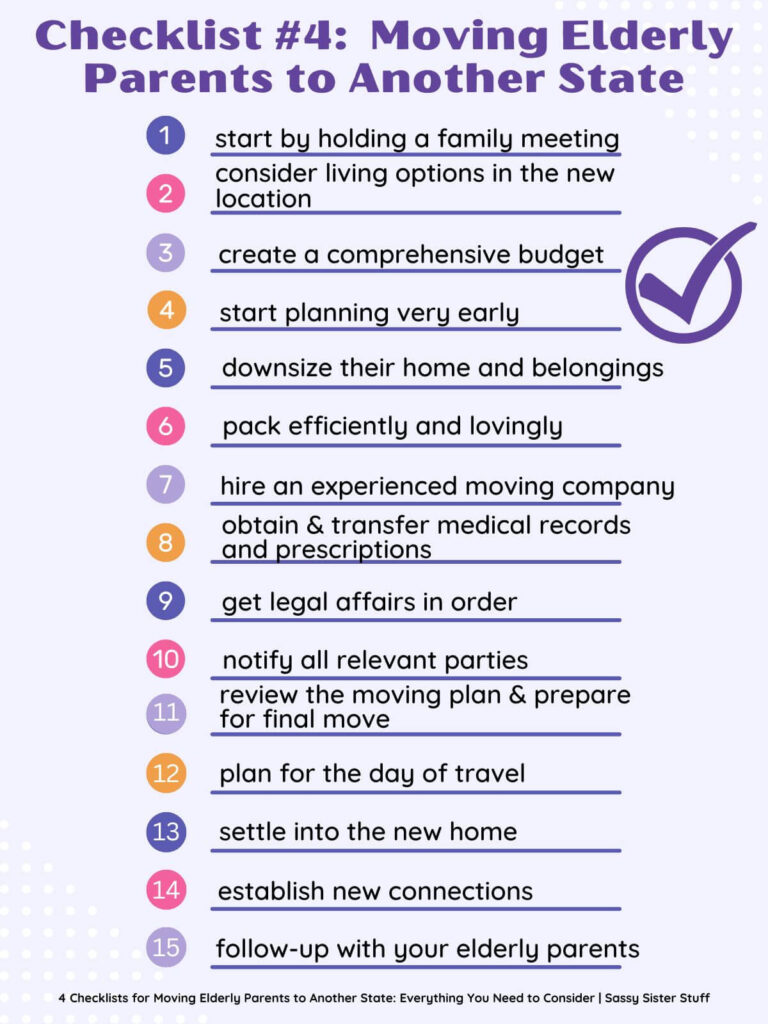4 Essential Checklists for Moving Elderly Parents to Another State
Moving elderly parents to another state can be a difficult and emotional decision for both you and your parents. It’s important to approach the situation with sensitivity and care, considering your parents’ needs as well as yours.
This article will explore the best ways to make such a move easier for everyone involved, providing helpful tips and insights for making this transition smoother. You’ll also find reasons to consider a move, benefits to moving your parents closer to you, and a comprehensive checklist for moving your elderly parents to another state.

Related Article: 79 Uplifting Quotes About Caring for Elderly Parents
Everything to Consider Before Moving Your Parents
Moving elderly parents to another state can be a big decision that requires careful consideration of several factors. But if they are unable to safely live alone anymore, and clearly need some form of assistance, it could be the only decision.
In this section, you will find a brief summary of the big issues you need to consider while thinking about a transition for your elderly parents regardless of the reason for the move.
- Health and Medical Needs: The first thing to consider is the health and medical needs of your elderly parents. Will they be able to access the medical care they need in the new location? Are there hospitals, doctors, and specialists nearby who can provide the necessary care? It’s important to research the healthcare facilities and services available in the new location and ensure they can meet your parents’ needs.
- Social Support: Moving to a new state can be isolating, particularly for older adults who may have built a social network over many years. Consider whether your parents will have access to social support, such as friends or family members in the new location, or community resources like senior centers or social clubs.
- Financial Considerations: Moving can be expensive, so it’s important to consider the financial implications of the move. This includes the cost of housing, transportation, and any additional care or support your parents may need. If your parents are on a fixed income, ensure that they will be able to afford the cost of living in the new location.
- Legal and Administrative Considerations: Moving to a new state may require updating legal and administrative documents, such as wills, trusts, and powers of attorney. Consider consulting with an attorney who specializes in elder law to ensure that all necessary documents are updated and in compliance with the laws of the new state.
- Emotional Impact: Moving to a new state can be a stressful and emotional experience, particularly for older adults who may have lived in the same place for many years. Consider the emotional impact of the move on your parents and ensure that they are prepared for the changes that will come with living in a new location.
You should engage in open and honest conversations with your parents, and other involved family members, about a possible move. It may initially be an intimidating and overwhelming process, but moving may be necessary if your parents show signs of needing assistance.
By carefully considering these factors, you can begin to make an informed decision about whether moving your elderly parents to another state is the right choice for them.

Reasons to Consider Moving your Parents to Another State
There are several reasons why you might need to consider moving your elderly parents to another state. While these decisions can be very personal and scary, all options for elderly parents should be addressed honestly and openly for the benefit of your parents. Ultimately, a move may even benefit the whole family.
These are just some reasons you may need to consider moving your elderly parents to another state:
- Closer proximity to family members: Moving your elderly parents to another state might be necessary to ensure they are closer to other family members who can provide them with care and support. They will also likely enjoy spending more time with grandchildren.
- Better healthcare: If your parents require specialized healthcare services that are not available in their current state, you may need to move them to a state that has the necessary healthcare resources. There are specialized hospitals all over the country that serve people with various illnesses or conditions.
- Climate: The climate of the state where your elderly parents currently reside might not be suitable for their health or comfort. For instance, if they have respiratory issues, you may need to move them to a state with a more temperate climate.
- Cost of living: The cost of living in the state where your elderly parents currently reside might be too high for them to afford. Moving them to a state with a lower cost of living can help them save money and improve their quality of life.
- Safety: If your parents live in an area with high crime rates or natural disaster risks, you may need to move them to a safer location. As they’ve gotten older, they become more susceptible to crime. They may also be experiencing a higher degree of anxiety because of the crime.
- Social support: If your parents are feeling isolated or lonely, moving them to a state with more social support and community activities can help improve their mental health and well-being. Maybe they should be moved to a community where other same-age family members live and thrive.
- Access to transportation: If your parents can no longer drive or need assistance with transportation, moving them to a state with better public transportation or access to ride-sharing services can help them maintain their independence.
- You constantly have to travel to check on them or solve a problem: If you have realized your trips to see your parents are more frequent because of their declining health, or maybe the death of their partner, you might discover that it would be in everyone’s best interest to consider a move.
Overall, there are many valid reasons why you might need to consider moving your elderly parents to another state. It’s essential to evaluate each factor carefully and make an informed decision that best meets your elderly parents’ needs and preferences.

Benefits of Moving Elderly Parents Closer to You
Moving elderly parents closer to you can have numerous benefits for both you and your parents. Talking through all issues clearly with your parents may help them see the benefits of moving to another state even if they are initially resistant.
Here are some benefits you should discuss if you are considering a move closer to you:
- Easier to provide care and support: If your parents require assistance with daily living activities or have medical needs, living closer to you can make it easier for you to provide care and support.
- Improved quality of life: Moving elderly parents closer to you can help improve their quality of life by providing them with more social support, opportunities for activities, and access to healthcare services.
- Increased peace of mind: Living closer to your elderly parents can give you peace of mind knowing that you are nearby to help in case of an emergency or if they need assistance.
- Better communication: Living closer to your parents can help improve communication and allow you to stay more informed about their health and well-being.
- Reduced travel time and costs: Moving your parents closer to you can reduce travel time and costs associated with visiting them. This can be especially beneficial if you visit them frequently.
- Enhanced family relationships: Moving your elderly parents closer to you can help strengthen family relationships and provide more opportunities for spending quality time together.
- Reduced social isolation: Living closer to family members can help reduce social isolation and loneliness, which can be particularly challenging for elderly individuals.
- Improved mental health: Moving your elderly parents closer to you can help improve their mental health by providing them with more opportunities for socialization, stimulation, and mental engagement.
Related Article: 9 Key Benefits of Living with Elderly Parents
Overall, there are many benefits to consider when moving elderly parents closer to you. It’s important to weigh these benefits carefully and make a decision that meets your parents’ needs and preferences while also taking into account your own circumstances and resources.

Steps for Moving Elderly Parents to Another State
Moving elderly parents out of their home and to another state can be a complex process, so it’s essential to have a comprehensive checklist to ensure that everything goes smoothly. You want to avoid miscommunication and misunderstandings as much as possible during this transition since everyone may already be anxious and emotional.
Here’s a thorough and complete checklist for moving elderly parents to another state:
- Start by holding a family meeting: Be sure to include all parties involved and make sure everyone is on the same page. What kind of care do your aging parents need? Is there a family caregiver available to provide appropriate support? Talk to your parents’ doctors about their needs in preparation for your family meeting.
- Consider living options in the new location: Research and visit the new location to determine if it will meet your elderly parents’ needs in terms of healthcare, social life, and accessibility. Will independent living in a senior community be the best option? Or will home care with your family work? You may need to consider an assisted living facility, enhanced living options, and memory care if your elderly parents have Alzheimer’s or dementia. Will you need to visit nursing homes or will skilled nursing in your home be sufficient? Make informed decisions with all involved parties.
- Create a comprehensive budget: Create a budget for the move, including all the expenses such as moving costs, transportation, and other associated fees. Develop a detailed moving plan.
- Start planning early: Begin planning the move as early as possible to ensure that everything is organized before moving day. There is a lot to consider for this kind of transition. Determine a moving date so you can secure necessary help and notify appropriate people.
- Begin the process of downsizing their home and belongings: Help your parents downsize their belongings to reduce the amount of clutter and unnecessary items that need to be moved. Be respectful of their feelings about things that are meaningful to them.
- Pack efficiently: Pack all their belongings efficiently, labeling the boxes with the contents and the room where they belong. Remember, your parents have many items that they cherish — be sure to pack lovingly and be considerate of their feelings.
- Hire a reputable moving company: Research and hire a reputable moving company that has experience with senior moves. This has been proven to be a very important element of this kind of move.
- Obtain medical records: Obtain all medical records from your parent’s healthcare provider and transfer them to a new healthcare provider. Keep copies for the future in case of a problem. Transfer prescriptions to a pharmacy in the new state. Check to make sure to make sure health insurance in valid in the new state, or obtain new health insurance for them.
- Get legal affairs in order: Several legal affairs need to be addressed to ensure that the transition is smooth and legally compliant. It is highly advisable to consult with an attorney specializing in elder care about these issues. Be sure to update wills, trusts, powers of attorney, and healthcare directives to reflect laws of the new state. Get a new driver’s license and car registration, if applicable.
- Notify relevant parties of the move: Notify all relevant parties, such as the post office, banks, and utility companies, of the move and provide them with the new address.
- Review the moving plan and prepare for the final move: Now it’s time to confirm that everyone is on the same page with the final move and everything is in order for the move.
- Plan for the day of travel: Plan the travel arrangements for your parents, including flights, accommodations, and any necessary transportation. Arrange meet-up times and facilitate ease of travel for them. Travel with them if necessary or hire someone who can.
- Settle into the new home: Help your parents settle into their new home by unpacking their belongings, arranging the furniture, and familiarizing them with the new location. Help them re-create their routines and make sure they are happy. Help make their new home comfortable and cozy for them. Put their belongings in similar places where they used to be. Stock their refrigerator and cabinets. Remove obstacles that could be safety issues, check for grab bars, add handheld showerheads and stools in the showers, install a home security system, and consider an emergency alert device. If you are not in the area, you could also check into hiring a geriatric care manager to help your parents.
- Establish new connections: Help your parents establish new connections in the new location, such as doctors, pharmacies, social groups, and community centers. Help them meet their new neighbors. Secure transportation to and from places they need to go regularly. Take the time to explore the new surroundings with your parents. This can include visiting local parks, museums, and restaurants. This can help your parents feel more connected to the new community.
- Follow up: Follow up with all parties involved, such as the moving company and healthcare providers, to ensure everything is working smoothly. Be sure to visit your parents often and ensure that they are adjusting to their new home.
Moving elderly parents to another state can be stressful, but with a comprehensive checklist, it can be a smooth process that ensures your parents are comfortable and safe in their new home.

More Tips and Insights for Moving Elderly Parents
Moving to a new state can be challenging for anyone, but it can be especially difficult for elderly parents who are accustomed to their current surroundings and may have established social connections. I’d like to share a few more tips that can help make the transition smoother.
Research, research, research. You can never gain too much knowledge about the best and worst states for elderly adults while making this decision. Many states have long been known to be poor choices for retirees and senior adults, while others have been known to treat seniors quite well. However, there are countless articles online that can help you learn more specific information from year-to-year about each state.
Be sure to involve your parents in all aspects of the decision-making process. Discuss the reasons for the move and involve them as much as possible. This can help to reduce anxiety and increase their sense of control. Be sure to have them involved in researching the new location and looking for activities and services that are important to them.
Encourage your parents to keep in touch with old friends. Moving to a new state can be isolating, especially for elderly parents who have left behind close friends and family. Encourage them to actively stay in touch through phone calls, emails, and video chats. You can even be involved in those communications!
Please be patient with your parents. Moving to a new state is a big adjustment, and it’s important to be patient and understanding with your parents. Give them time to adjust at their own pace. This can help reduce stress and anxiety for everyone involved.
Moving to a new state can be a big change, and it’s important that your elderly parents have a support system in place. This can include family members, friends, neighbors, church members, and community resources. Make sure your parents know who to contact if they need help, and encourage them to reach out if they need support.
Be sure to develop a comprehensive plan for emergencies. It’s important to have a plan in place for emergencies, such as a medical emergency or severe weather. Make sure your parents know what to do in case of an emergency, and have a plan in place for getting help if needed.
Encourage your parents to stay active. Physical activity is important for both physical and mental health. Encourage them to take walks, participate in exercise classes, or join a local senior center. Staying active can help them maintain their physical and mental health, and can also help them make new social connections.
And finally, just in case you find yourself dealing with difficult or irrational elderly parents who resist your efforts to help, be sure to focus on positive moments and don’t take their behavior personally. (By clicking on the link in this paragraph, you’ll find an article with 21 tips to help you deal with the situation:)

Final Thoughts: Moving Your Parents to Another State
In conclusion, the decision to move elderly parents to another state can be a difficult and emotionally charged one. However, with proper planning and communication between all involved, it can be done in a way that is respectful and beneficial for all parties.
It’s important to take into consideration the emotional impact that this kind of move can have on your parents, while also making sure the transition is as smooth as possible.
Taking time to research the area, as well as seeking out local resources that can support your parents’ transition, can help ensure their safety and comfort in their new home.
As an adult child of elderly parents, you want to ensure that your loved ones are safe, comfortable, and well taken care of, no matter where they live.
By taking into consideration all aspects of relocating elderly parents, and following the checklists carefully, you and your parents should be able to make this work for the whole family.
I hope you’ve found these checklists, tips, and insights helpful. I’m sure your parents appreciate everything you are doing to support them! I know it can be difficult even under the best of circumstances — but you’re got this!
Wishing you the very best!
Love to ALL! ~ Susan







